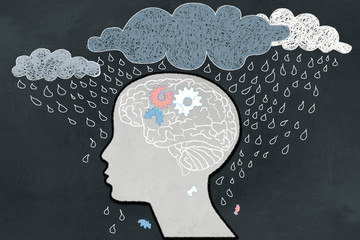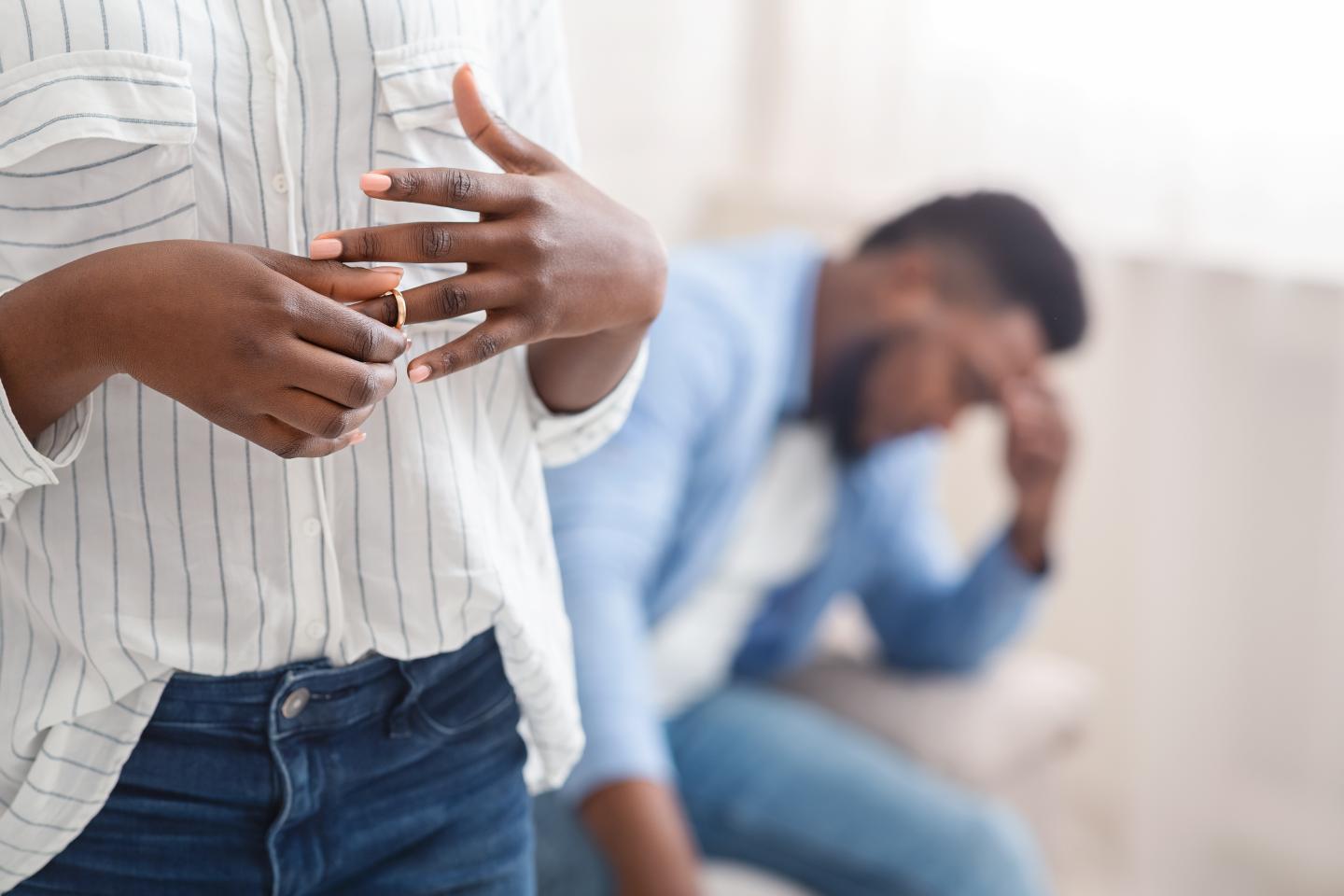Depression brought on by heartbreak is known as situational depression. Any depression that is triggered by a major life change or trauma is considered situational depression. So now you know what it is and you want to know how to deal with heartbreak depression.
Situational depression is not the same as clinical depression, but they do share the same symptoms. The symptoms include:
- Anxiety
- Loss of appetite
- Crying spells
- A change in sleeping patterns
- Loss of concentration
- Tiredness
- Drug abuse
- Alcohol abuse
- A feeling of impending doom
- Feeling listless
Situational depression often goes untreated and that is the bad part. Most people mistake their symptoms for just what they are. The truth is that this can be as debilitating as clinical depression. Studies show that our brain registers emotional pain the same way it registers physical pain. This is why for many, a heartbreak causes them physical pain.
How Long Does Heartbreak Take to Heal?

One study claims that the healing process can take approximately three months or 11 weeks to be complete. It is after this time that most people can start feeling more positive about a break-up.
There really is no cure for being heartbroken or situationally/clinically depressed. There are a couple things that can help you get through the experience though. These tips can help you, but they should never be used as a substitute for professional help. Professional help is very important if you are suffering from depression. The minute you think you are past the point of just a little sadness you should try to get help. But you can try these first!
- Don’t try to Stop the Feeling.
Your first instinct when dealing with a broken heart may be to pretend that you are not really sad. It is so easy for us to bury ourselves in social media or in work and allow the buzz to detract from our actual feelings. But ignoring your feelings will only allow the negative emotions to take a deeper root. Don’t be afraid to confront your feelings of sadness. Honor it and let yourself feel it. When you ignore your sadness, this can cause you to manifest the pain by drinking or drugging which can be destructive.
Cry if you need to, talk to someone who is willing to listen. If you don’t have anyone to listen, then write it out. Write about how you feel and release the feelings into the atmosphere. While having these feelings hurts, you can rest assured that they are temporary. Feelings are especially temporary. When you can trust that you won’t feel these feelings forever you can stop seeking comfort in alcohol and drugs.
- Tell Your Family and Close Friends
It is easy to feel ashamed when you are heartbroken, especially if you blame yourself for the breakup. You are not weak and it is not wrong to feel ashamed but you really don’t have to let these feelings guilt you into not talking to your friends and family members.
Support is what you need when you are heartbroken. Your real friends and family members are here for you. Lean on them when your world is falling apart and your heart if falling to pieces. While you may be able to get through it by yourself, there is no need for you to do it by yourself and it will be much easier if you have people who support you to fall back on.
Expressing vulnerability can be hard and you may even feel embarrassed to do this but you may be surprised to see how many people will show up for you when you express yourself. Statistics show that when just one person shares their store, more people will come forward about their own hardships. That is how a community is built.
The best part is that when you open up about your struggle, you will be reducing the amount of shame you feel. Knowing you are not alone is the most powerful weapon in your arsenal to get through your breakup.
- Exercise – It Helps
Depression causes you to feel disconnected from your body. Research shows that exercise is very beneficial for all types and severity of depression. It doesn’t really matter what you do as long as you get your body moving. With just 30 minutes of activity you can feel an improvement in your mood thanks to the release of serotonin that is experienced with exercise.
- Get Professional Help
So many people never see a therapist until they have a major breakup. Those who go this route always indicate it was the best decision of their lives.
Yes therapy costs, but it is not a waste of money, what it is, is an investment in yourself. Your therapist will help you get through your tough time and also help you to gain a better understanding of yourself. They will help you to understand the things that have happened in your life and how they impact your feelings and your life on a whole.
Once you realize what your needs are you can start your healing. There are many resources available that you can use regardless of your financial status or your physical location. Some options that can be accessed from anywhere include:
- The Crisis Text Line – 24/7 chat support
- Talkspace – Online Counseling
- Teen Line – Call, Text and Online Support
- Mental Health America – Will Help Find you a Counselor
11 Signs What You are Feeling is More Than The Heartbreak

It can be a slow and confusing process as you learn to deal with your heartbreak. But there is a thin line between suffering from heartbreak and something that is way more serious. Heartbreak is how you grieve the loss of your relationship and the loss of your partner. They were important to you and now they are gone.
It is very hard for you to figure out if you are grieving or if you are really depressed. The best way is to seek the help of a licensed mental health professional. Heartbreak looks like a number of other things and depression is just one of them. If you are predisposed to depression, a breakup can trigger an episode.
With the right protective factors you can get through this whether it is heartbreak or it is full-blown situational depression. Protective factors include:
- Emotional support systems
- Access to medical care
- Stable employment
- Spiritual belief system
If you are missing some or all of these supports you can be hit harder by your pain. Any symptom that is long-lasting or debilitating can indicate your need for help. But here are 11 signs you could be feeling more than simply heartbreak.
- You Are Physically Ill
When you are heartbroken this can be overwhelmingly distressing on your body. Some persons have physical symptoms such as hypersomnia, insomnia, increased appetite, low appetite, low energy, headache, vomiting, diarrhea or even nausea. But if you are having these physical symptoms, and they are not getting better but instead seem to be getting worse until they start to affect your day to day life then this may be more than just heartbreak symptoms.
Now is when you need to take care of yourself more than ever as you will need to be resilient the most now that you are hurting and may feel alone.
- You Can Only Think About That One Thing
It is understandable that your ex would be on your mind, but if they are all you can think about, you really need to reassess. If you keep blaming yourself and replaying the events of the breakup over and over to the point where it takes over your thoughts completely, then you are way past heartbreak. THis is especially true if you feel like your life will be worthless without the other person.
Even after finding your balance, you may have some of the symptoms of heartbreak from time to time. You will think of your ex from time to time, but the relationship will fade over time, especially when you have the support you need.
- You Avoid Your Friends
When you are at the point where you are going out of your way to avoid your friends, this is a tell tale sign that this is more than heartbreak. While it can be hard to maintain friendships after a breakup, you don’t want to be avoiding them at all costs. Even though they are not mental health professionals, they can still be a breath of fresh air.
If you are avoiding your friends because they are tired of hearing about your breakup – it’s time to talk to a professional. Their job is to listen, and so they won’t get tired of hearing from you. The best thing is that they are a neutral third party so it will be easier for you to unload on them.
- You Can’t Focus at Work
Going to work after a breakup can be extremely hard. But when it is that your work is not distracting you and you are instead distracted by your thoughts of the break up and all related things, it is time to make a step to get help. Take care of yourself by getting the help you need.
It’s worse if you have outright stopped going to work. You may be dreading the office and all the interactions there, and it is OK to take a day to cool off and get the bulk of the crying out. But if you are taking days off from work and just laying in the dark in bed, it’s time to make an appointment with a professional.
- Your Needs are Not Being Met
When you are grieving, you still need to take care of yourself. Even with your partner gone, you are not a half. You are still a whole and you are responsible for your whole self. It is even more important now that you have to recenter your life so that you are the sole focus.
If you find that you cannot go through the motions of combing your hair or showering, this is a sign that you need help.
- You No Longer Engage in Enjoyable Activities
It is normal to not have the urge to go out when you are feeling down. But if you are finding a lot of things you used to enjoy not being so enjoyable anymore, then you could be depressed.
The emotional pain is creating a barrier to how you are experiencing things that you used to love. Your body is going through major physiological and emotional changes and it may just need a little help getting started again.
- You are Not Setting Boundaries
It can be hard to find closure after a breakup and so it can be hard to set boundaries. Are you finding yourself doing more Instagram creeping every night? Are you noticing a pattern of obsessing on the person or structuring your life, so your likelihood of bumping into them is higher?
If you can’t set boundaries to stick to not texting or calling, you will need to get some help from a friend. Get an accountability partner. Block them on social media or take a break for a while, so you are not tempted to peek. Uninstall the app from your phone and find something else to do, ready a book, talk to a friend, play a game or seek the help of a professional in the mental health field.
- Refusing to Date Again
Dating again can be the last thing you want to think about, especially soon after your breakup. But if a considerable amount of time has passed and you are simply refusing to put your foot into the water for the wrong reasons then you may want to check in with a mental health professional.
- You are Leaning on Substances
If the only way you can feel better is by self-mediating you definitely need to get a professional to talk to. Substances can prevent you from getting to the root of the issue, and they can be dangerous themselves, causing other problems and even intensifying your depression .
- You Can’t Sleep
It’s common to not be able to sleep for the first couple nights after the breakup. Especially if you were used to sharing a bed with your partner. If the insomnia follows you for weeks and months after the breakup it is more than just the heartbreak talking.
- The Sadness Won’t Go Away
All these feelings are normal when you are grieving. They are not normal when they are constant and wreaking havoc with the balance of your life. If you are not able to keep up with life, it sounds like you need help.

There is no exact time frame, but there are signs, those mentioned above. Are you just heartbroken or are you depressed? You can be heartbroken and sad without being depressed but it’s a thin line and sometimes only a professional can give you the right guidance for dealing with it all. Even if you don’t think you are depressed, if you don’t have social and emotional support in the form of friends and family, you will want to reach out to a professional .
Heartbreak will always feel terrible, it is emotionally and physically painful, and it may disrupt your life in a very significant way, especially if the relationship was particularly serious. It hurts to be rejected romantically more than any other type of rejection. And it will worsen any other distress you are or were suffering from.
Even if you aren’t depressed you should consider talking to a professional to help you through what you are processing. Support is always a good thing and it will help you to heal faster. Now you know how to deal with heartbreak depression, take the necessary steps to take care of yourself. Take advantage of our free consultation.
Do you struggle with depression?
We have clinicians expert on depression, feel free to read about them, or book a free consultation to review your situation.
